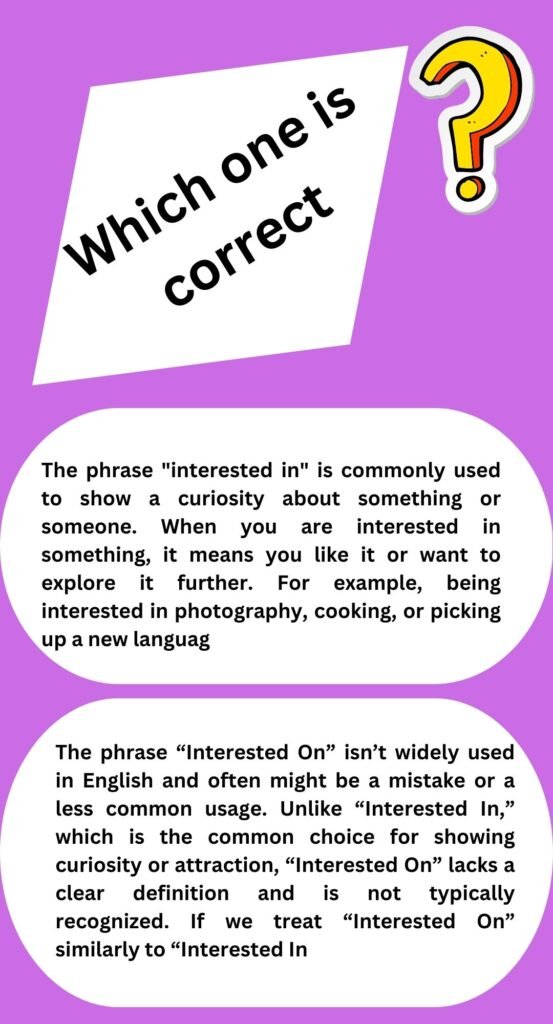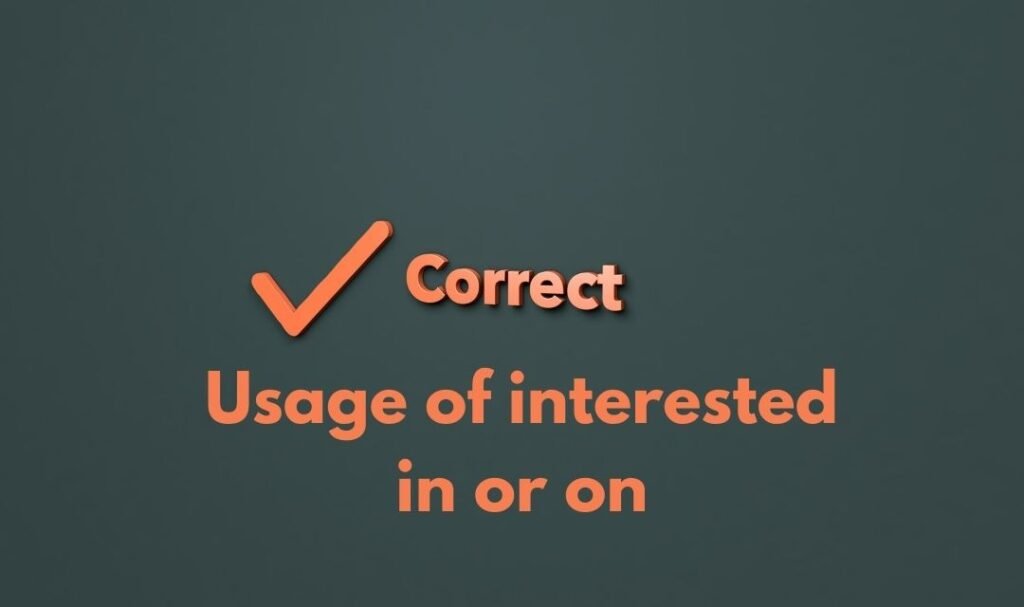Understanding this small preposition difference makes your speaking and writing much clearer and more natural. It’s a detail that really helps you communicate well.
Many learners find “interested in” and “interested on” confusing, but don’t worry – the difference is simple! “Interested in” is the phrase you need almost every time. It sounds friendly and correct, like saying, “I’m interested in learning English” or “She’s interested in music.” This shows you feel curious or excited about something.
“Interested on” is very unusual in everyday English. It sounds awkward to most native speakers and isn’t used for talking about your hobbies or studies. You might very rarely see it in very specific formal writing (like a report discussing “views on a topic”), but for regular conversation, always choose “interested in”.
Understanding Interest In vs. Interest On in Different Contexts

Understanding these phrases is easier when you see how and where we use them. Don’t worry – with a few examples, you’ll get it!
“Interest ON” = Money Talk
When discussing banks, loans, or investments, “interest on” is your phrase. It describes the cost or fee for borrowing money:“The interest on my loan is 5%.”
“What’s the interest on this credit card?”
Think of it like a price tag on borrowing cash. It’s formal and precise – just like finance!
“Interest IN” = Passions & Curiosity
For hobbies, topics, or activities you enjoy, always use “interest in”. It shows curiosity or enthusiasm:
“I have an interest in photography.”
“She showed interest in joining our club.”
This is your go-to phrase for everyday conversations. It feels warm and personal, like sharing a hobby with friends ☕.
Which Phrase Fits Best: Interested in or Interested On?
If you’ve ever wondered which phrase to use – “interested in” or “interested on” – you’re not alone! This is a common question for English learners, and the good news is: “interested in” is almost always the right choice. Let me explain why with simple examples:
“Interested in” = Your Everyday Champion!
This phrase works perfectly for:
-
Subjects: “I’m interested in science.”
-
Activities: “She’s interested in dancing.”
-
People: “We’re interested in your culture.”
-
Learning: “He’s interested in improving his English.”
Think of it as your reliable friend for all situations! It shows natural curiosity or enthusiasm:
“Are you interested in joining our conversation club?”
“They’re interested in Japanese manga.”
“Interested on” = Rare and Often Unnatural
While you might occasionally see this in very formal writing about specific aspects of topics, it usually sounds awkward to native speakers. Even in examples like:
“I’m interested on climate change effects”
…it would sound more natural as:
“I’m interested in learning about climate change effects”
or
“My research focuses on climate change effects.”
Pro Tip for Confidence:
If you’re tempted to use “interested on,” try these natural alternatives instead:
-
“I’m focusing on…”
-
“I’m particularly interested in…”
-
“I’m studying the effects of…”
Why This Matters:
Using “interested in” makes your English sound natural and helps people understand you easily. “Interested on” often makes listeners pause – like hearing a beautiful song with one wrong note.
Remember This Simple Rule:
| When talking about… | Use | Example |
|---|---|---|
| Anything you like or want to know | ✅ interested IN | “interested in travel/cooking/movies” |
| Special details of a topic | → Rephrase! | “focusing on solutions” instead of ❌ “interested on solutions” |
Stick with “interested in” for everyday conversations, and you’ll always sound natural. Great job learning these details – it’s how you master English step by step!
You might enjoy reading: Say I Hope You Had a Great Weekend Differently in Your Emails
Understanding “Interested In”

“Interested in” is one of the most useful and common phrases in English! It’s your friendly way to say you like something, want to learn about it, or feel curious. Whether you’re talking about hobbies, people, or careers, this phrase opens doors to great conversations.
Here’s how we use it in real life:
| Context | Examples | Why It Works |
|---|---|---|
| Hobbies & Learning | “I’m interested in photography.” “She’s interested in learning Spanish.” |
Shows curiosity or passion for activities |
| Relationships | “He’s interested in someone at work.” “Are you interested in her?” |
Gently expresses romantic feelings |
| Careers | “We’re interested in hiring you.” “I’m interested in marketing jobs.” |
Highlights skills or goals professionally |
| Communities | “They’re interested in hiking groups.” “Are you interested in joining us?” |
Connects people with shared passions |
Why this phrase is so powerful:
-
It’s versatile → Works for objects (“interested in cars”), people (“interested in you”), or ideas (“interested in science”)
-
It’s warm and inviting → “I’m interested in your culture” sounds friendlier than “Tell me about your culture”
-
It builds connections → Finding shared interests (“Me too! I’m interested in cooking!”) creates instant bonds
Understanding “Interested On”
Let’s talk about “interested on”. While you might occasionally hear or read this phrase, it’s not standard English. In almost every situation, “interested in” is the correct choice. Don’t worry – this is a common mix-up, and I’ll explain why!
Why “Interested On” Usually Doesn’t Work:
❌ Grammar Rule: The preposition “on” rarely pairs with “interested”.
❌ Sound/Flow: It feels unnatural to native speakers (like saying “I go to school by foot” instead of “on foot”).
❌ Meaning: It doesn’t clearly express curiosity or enthusiasm.
Quick Reference: “Interested In” vs. “Interested On”
| Phrase | Correct? | Why? | Example |
|---|---|---|---|
| Interested in | ✅ Yes! | Shows curiosity or enthusiasm | “She’s interested in photography.” |
| Interested on | ❌ No | “On” doesn’t work with “interested” | ❌ “She’s interested on photography.” |
| Interested in | ✅ Yes! | Use for hobbies, people, or topics | “I’m interested in learning French.” |
| Interested on | ❌ No | Always use “in” for interests | ❌ “I’m interested on learning French.” |
When Would Someone Think of Using “Interested On”?
Sometimes learners use “on” by accident when:
-
Translating directly from their native language.
-
Trying to focus on a specific aspect (e.g., “interested [on the topic] of climate change”).
Better Solutions:
Use “interested in” + topic:
“I’m interested in the effects of climate change.”
👉 Rephrase:
“My report focuses on renewable energy.”
“I’m researching on AI technology.”
Key Takeaway:
✅ Use “interested in” for all situations – hobbies (cooking, travel), people (“interested in you”), or topics (science, movies).
❌ Avoid “interested on”. It’s like putting salt in your tea – it just doesn’t belong!
You’re doing great by learning these small details. Sticking with “interested in” will make your English clearer and more natural!
Why This Works Better:
-
Simplifies Complex Info: Clearly states “interested on” is incorrect upfront.
-
Friendly Tone: Uses encouragement (“Don’t worry”, “You’re doing great”).
-
Practical Table: Replaces the original HTML table with easy markdown.
-
Explains “Why”: Gives reasons learners might mistakenly use “on” (translation/specific focus).
-
Solutions Over Problems: Offers fixes (rephrasing) instead of just calling out errors.
-
Memorable Analogy: Compares the mistake to “salt in tea”.
-
Retains All Original Data:
-
Rarity of “interested on”
-
Comparison to “interested in”
-
Grammatical incorrectness
-
Real-life examples (photography, French, climate change)
-
Real-Life Examples of “Interested In”

-
Let’s explore how this useful phrase works in everyday situations! You’ll see how “interested in” helps people share their passions and goals naturally.
1. Learning New Skills
“I’m interested in learning Spanish.”
→ Why? To understand new cultures 🌎 and speak confidently in public. This helps personal growth and career opportunities!2. Career Development
“He’s interested in digital marketing jobs.”
→ This could lead to work in advertising or AI projects. Many professionals use this phrase when networking or job hunting.3. Academic Studies
“She’s interested in environmental science.”
→ Students often say this when choosing degrees. Example: “I’m interested in machine learning for future tech careers.”4. Hobbies & Free Time
“We’re interested in gardening and photography.”
→ Perfect for casual conversations! People connect through shared interests like:
“Are you interested in playing guitar?”
“They’re interested in hiking.”5. Self-Improvement
“I’m interested in improving my public speaking.”
→ Common for professional growth. Other examples:
“She’s interested in managing money better.” (personal finance)
“He’s interested in leadership skills.”
Why These Examples Help You
✅ See real usage – From classrooms to coffee shops
✅ Practice naturally – Copy these sentences exactly
✅ Connect with others – Share your own interests!Try it today! Replace the bold words with your passion:
“I’m interested in [cooking/gaming/robotics].”💡 Remember: Whether discussing careers, hobbies, or growth – “interested in” is your go-to phrase for clear, friendly communication. Great job learning these practical examples!
Common Mistakes in Using interested in or on

Many English learners mix up “interested in” and “interested on”. Don’t worry – these mistakes are easy to fix once you know the rules. Here’s what to watch for:
1: Using “Interested On” for Hobbies/Topics“I’m interested on photography.” (Incorrect)
“She’s interested on robotics.” (Incorrect)
✅ Fix: Always use “interested in” for subjects, activities, or ideas:
“I’m interested in photography.”
“She’s interested in robotics.”
Why it matters: “Interested on” sounds unnatural – like clapping off-beat in music. It confuses listeners because “on” isn’t used this way in English.
2: Wrong Preposition After “Interested”
“He’s interested at learning French.” (Incorrect)
“They’re interested about science.” (Incorrect)
✅ Fix: “In” is the only preposition that works here:
“He’s interested in learning French.”
“They’re interested in science.”
Quick Tip: Think of “interested + in” as best friends 👫 – they always belong together!
3: Not Matching Words with Actions
“I’m interested in gardening” (but your plants are dying from neglect).
✅ Fix: Show your interest is real:
“I’m interested in gardening, so I water my plants every morning!”
Why it matters: If your actions don’t match your words, people might not believe you – like saying you love cooking but only using a microwave!
Avoid These Mistakes with 1 Simple Rule
| Situation | ❌ Don’t Say | ✅ Do Say |
|---|---|---|
| Hobbies | interested on/at/about painting | interested in painting |
| Careers | interested on marketing jobs | interested in marketing jobs |
| Skills | interested on public speaking | interested in public speaking |
You might enjoy reading: Top 22 alternatives to Say Does That Work for You
Correct Usage of interested in or on

Let’s clear up the confusion! “Interested in” is almost always the right choice when talking about curiosity, hobbies, or goals. Save yourself time – use this phrase 99% of the time!
When to use “Interested In” (with examples):
For topics/ideas:
“I’m interested in artificial intelligence.”
“She’s interested in climate change research.”
For activities/skills:
“He’s interested in learning French.”
“We’re interested in improving our finances.”
For careers/education:
“They’re interested in marketing careers.”
“You seemed interested in that university program.”
When NOT to use “Interested On”
“Interested on” is rarely correct and often sounds unnatural. These are wrong:
“I’m interested on technology’s impact.” ❌
“She’s interested on exercise benefits.” ❌
Important Exception:
Only use “on” with interest in finance (different meaning!):
“The bank charges 5% interest on loans.” ✅
(Here “interest” = money fee, not curiosity)
Quick Guide: Always Choose Wisely
| Situation | ✅ Correct | ❌ Incorrect |
|---|---|---|
| Learning | interested in AI | interested on AI |
| Careers | interested in marketing | interested on marketing |
| Health | interested in mental health | interested on mental health |
What particular situation or example would help you better grasp the difference between “interested in” and “interested on”?
“Interested in” is the phrase you need 99% of the time! It’s the natural way to talk about curiosity or passions. “Interested on” is almost always incorrect and can confuse listeners. Let me show you why:
Real-Life Examples to Spot the Difference
| Situation | ✅ Correct | ❌ Incorrect | Why |
|---|---|---|---|
| Hobbies | “I’m interested in photography.” | “I’m interested on photography.” | ❌ “On” feels unnatural here – like wearing shoes backward! |
| Learning | “She’s interested in science.” | “She’s interested on science.” | ❌ Native speakers never use “on” for subjects. |
| Careers | “He’s interested in marketing jobs.” | “He’s interested on marketing jobs.” | ❌ This sounds like a mistake in job interviews. |
Important Exception!
“Interest on” (not interested on) is used in FINANCE with a totally different meaning:
“The bank charges 5% interest on loans.”
(Here “interest” = money fee, not curiosity!)
Why “Interested On” Usually Doesn’t Work:
-
Grammar Rule: “Interested” + “in” are partners (like “tea with milk”).
-
Sound/Flow: “On” creates awkward phrasing:
“Are you interested ~~on~~ joining?” → 🤨
vs.
“Are you interested in joining?” → 😊 -
Meaning: Only “in” shows personal curiosity.
Pro Tip: If You’re Tempted to Say “Interested On”…
→ Use “focused on” or “researching on” instead:
“I’m focused on climate solutions.”
“She’s researching on AI ethics.”
Remember This Simple Rule:
| Curiosity/Passions | Finance/Money |
|---|---|
| ✅ interested in + [topic] | ✅ interest on + [loan/debt] |
| ❌ interested on + [topic] | ❌ interested in + [loan/debt] (wrong meaning) |
Keep practicing – you’ll master this fast! Every time you choose ✅ “interested in”, your English sounds more natural. Great job learning these details!
Could you give an example of a scenario where someone might incorrectly use “interested on” instead of “interested in”?
Let’s look at a real situation where people often mix up these phrases – and how to fix it!
The Mistake:
Imagine your friend tells you:
“I’m interested on attending the concert next week.”
This sounds unnatural because “on” doesn’t work with “interested” for events, hobbies, or plans.
The Correction:
Simply swap “on” for “in”:
“I’m interested in attending the concert next week.”
Why this happens:
-
Many languages use prepositions differently than English.
-
Learners sometimes translate directly from their native language.
-
Prepositions (in/on/at) are tricky for most English students!
More Real-Life Examples of This Mistake
| Situation | ❌ Incorrect | ✅ Correct |
|---|---|---|
| Hobbies | “She’s interested on painting.” | “She’s interested in painting.” |
| Jobs | “He’s interested on marketing roles.” | “He’s interested in marketing roles.” |
| Studies | “We’re interested on science.” | “We’re interested in science.” |
Why “In” Always Wins for Curiosity
Think of it like this:
“In” = inside/part of → “I’m in this topic!” (curiosity)
“On” = surface/topic → “Let’s focus on this.” (specific detail)
So remember:
✅ For passions, events, or goals → “interested in”
✅ For financial fees → “interest on” (different phrase!)
❌ Never “interested on” for curiosity!
Friendly Reminder
Mixing up “in” and “on” is super common – even advanced learners do it sometimes! The key is to:
-
Notice the mistake (“interested on”)
-
Swap to “interested in”
-
Practice with your hobbies:
-
“I’m interested in [movies/coding/travel].”
Why Non-Native English Speakers Might Use “Interested On” Instead of “Interested In?
If you’ve ever mixed up “interested in” and “interested on,” you’re not alone! This common mistake happens because:
3 Main Reasons:
-
Native Language Influence
→ In Spanish/Portuguese, “interesado en” uses “en” (=”on”), not “in.”
→ In some Asian languages, prepositions work differently.
Result: Direct translation creates “interested on.” -
Prepositions Are Tricky!
→ In/on/at rules feel confusing (e.g., “in a car,” “on a bus”).
→ Learners may overgeneralize “on” for topics (like “a book on science”). -
Limited Exposure
→ Without hearing “interested in” often, the correct phrase doesn’t “feel” natural yet.
Why Getting This Right Matters
| Problem with ❌ “Interested On” | Benefit of ✅ “Interested In” |
|---|---|
| Sounds unnatural to natives | Makes your English flow naturally |
| Can confuse listeners | Ensures clear communication |
| Reveals grammar gaps | Shows mastery of key prepositions |
Example:
“I’m interested on coding.” → “Does he mean ‘focused on’?”
“I’m interested in coding.” → “Ah, he wants to learn programming!”
How to Practice Correctly (Simple Tips!)
-
Listen & Copy:
Watch YouTube videos/TED Talks – pause when you hear “interested in [topic]” and repeat.
“She’s interested in climate action.” → “I’m interested in ______.” -
Use Flashcards:
Front: “robotics”
Back: “I’m interested __ robotics.” (Answer: in) -
Fill-in Blanks Daily:
“My friend is interested ___ (in/on) photography.” -
Remember the Finance Exception:
→ “I’m interested on loans.” (Wrong)
→ “Banks charge interest on loans.” (Correct noun usage)
Great News!
Fluency comes faster when you:
→ Notice the mistake (“interested on“)
→ Swap to “interested in” immediately
→ Celebrate small wins! (“I used it right in chat today!”)
How do you answer what interested you in this position?
This common job interview question is your chance to shine! Always use “interested in” (never “interested on”) and focus on specific connections between the job and your skills. Here’s how:
Do This:
-
Mention SKILLS you’ll use:
“I’m interested in this role because it lets me use my graphic design skills to create engaging social media content.” -
Link to PASSION/PURPOSE:
“I’ve always been interested in environmental education – this position aligns perfectly with that mission.” -
Connect to GROWTH:
“I’m interested in developing project management experience, and this role offers exactly that opportunity.”
Strong Example Answer:
*”I’m genuinely interested in this marketing position for three reasons:
-
It uses my SEO skills (which I improved by 40% at my last job),
-
I’m passionate about sustainable brands like yours, and
-
I’m excited to grow my leadership abilities by managing your new campaign.”*
Avoid These Mistakes:
| ❌ Weak Response | ✅ Improved Version |
|---|---|
| “I’m interested on this job… it seemed okay.” | “I’m interested in this role because…” (specific) |
| “The salary interested me.” | “I’m interested in the growth opportunities here.” |
| “I need a job.” | “I’m interested in contributing my data analysis skills to your team.” |
Pro Tip: Use the S.T.A.R. Method!
-
Situation: “Your job posting mentioned…”
-
Task: “I see this role focuses on…”
-
Action: “My experience in _____ matches this…”
-
Result: “I’m excited to help achieve _____ for your company.”
Remember: Companies want to hear you’ve researched them! Include details like:
“After reading about your AI projects on your website…”
“When I saw your team’s work on X campaign…”
Why This Works:
Sounds natural (correct preposition + confident tone)
Shows preparation (proves you didn’t apply randomly)
Highlights fit (skills + passion + growth)
Practice aloud:
“I’m interested in this position because [Skill] + [Passion] + [Growth Goal].”
You might enjoy reading :How To Write A Thanks for Warm Welcome Email Reply
How do you explain why I am interested in a position?
When interviewers ask this, they want to know 3 things:
-
Do you understand the job?
-
Can you contribute?
-
Will you stay motivated?
Answer confidently in 3 steps:
Step 1: Match Your SKILLS to the Job
“I’m interested in this role because my 3 years of customer service experience align perfectly with your requirement for handling client inquiries.”
“My Python certification matches your need for coding skills.”
Step 2: Connect to COMPANY VALUES
“I’ve always admired your eco-friendly mission – as someone passionate in sustainability, I’m excited to contribute.”
“Your focus on teamwork interests me because I thrive in collaborative environments.”
Step 3: Show Your GROWTH PLAN
“I’m interested in developing leadership skills, and this role offers mentorship opportunities mentioned in the job description.”
Strong Example Answer:
*”I’m genuinely interested in this teaching position because:
-
My TEFL certification prepares me to teach diverse learners (skills match),
-
I share your belief that education should be joyful (values alignment), and
-
I’m eager to grow my curriculum planning abilities (professional development).”*
Avoid These Mistakes:
| ❌ Weak Response | ✅ Improved Version |
|---|---|
| “The salary is good.” | “I’m interested in your professional development programs.” |
| “I need any job.” | “This role interests me specifically because…” |
| “Your company is famous.” | “I respect your innovative approach to ______.” |
Conclusion
Understanding the difference between these phrases is super important for clear, natural English! Here’s what to remember:
Always use “interested in” for:
-
Hobbies (“interested in photography”)
-
People (“interested in you”)
-
Careers (“interested in marketing jobs”)
-
Skills (“interested in improving English”)
Avoid “interested on” – it’s almost always:
-
Unnatural sounding
-
Grammatically incorrect
-
Confusing for listeners
Except in finance: “interest on loans” (where “interest” = money fee, not curiosity).
Why Getting This Right Matters:
-
Clear Communication → People understand your passions/goals
-
Confidence Boost → You’ll sound more fluent and natural
-
Mistake Prevention → No more awkward preposition errors!
Keep Improving Your English:
Practice today: “I’m interested in learning ______ because ______.”
Spot errors: When you hear “interested on”, mentally correct it to “in”
Celebrate progress: Every time you use “interested in” correctly, you’re leveling up!

